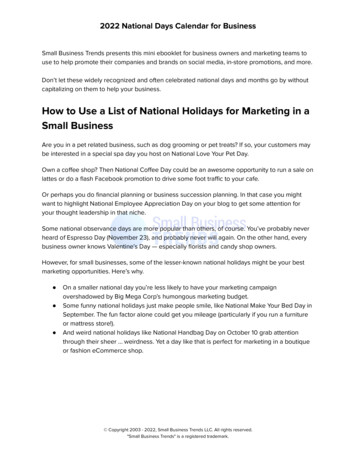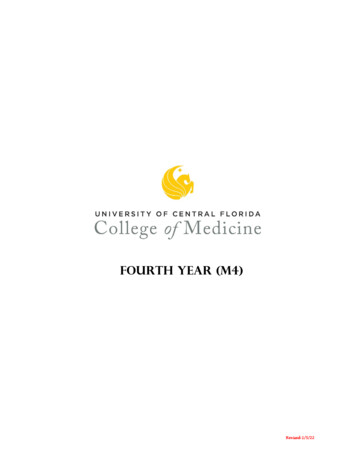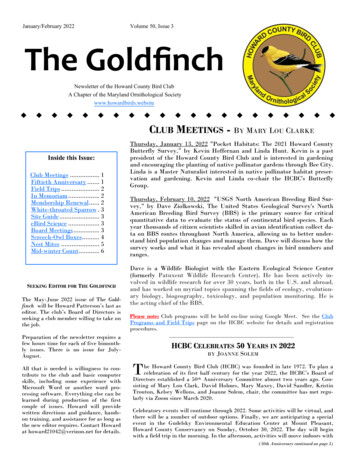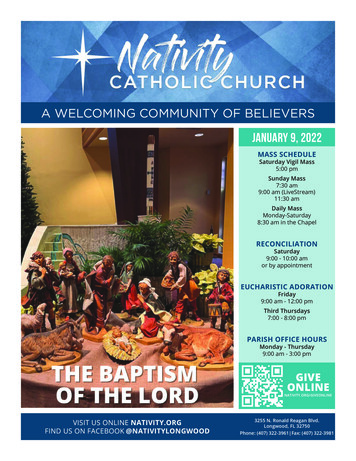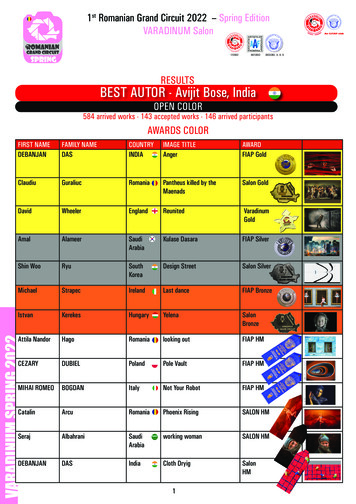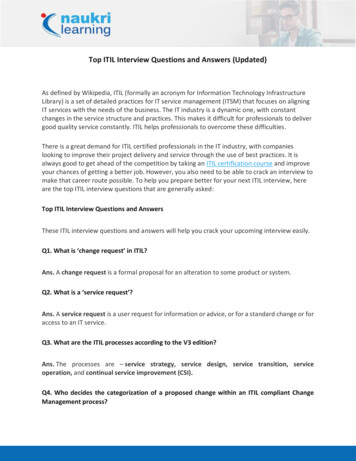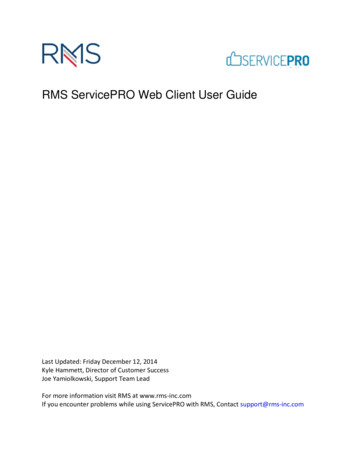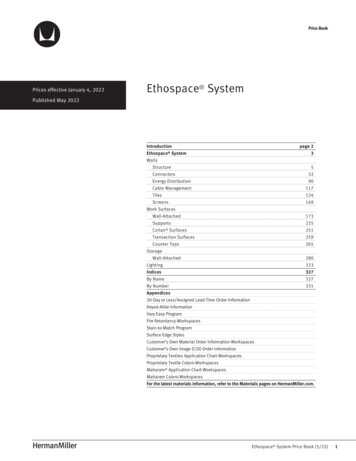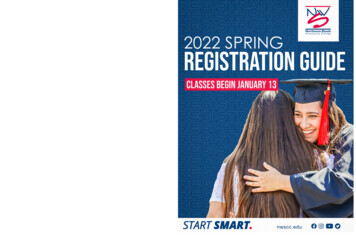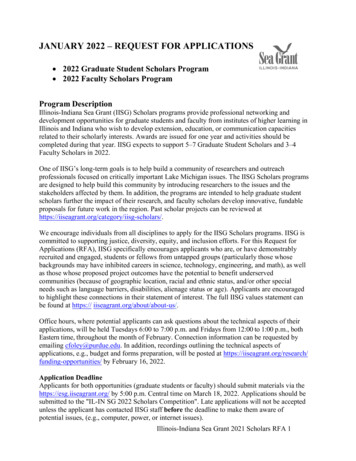
Transcription
JANUARY 2022 – REQUEST FOR APPLICATIONS 2022 Graduate Student Scholars Program 2022 Faculty Scholars ProgramProgram DescriptionIllinois-Indiana Sea Grant (IISG) Scholars programs provide professional networking anddevelopment opportunities for graduate students and faculty from institutes of higher learning inIllinois and Indiana who wish to develop extension, education, or communication capacitiesrelated to their scholarly interests. Awards are issued for one year and activities should becompleted during that year. IISG expects to support 5–7 Graduate Student Scholars and 3–4Faculty Scholars in 2022.One of IISG’s long-term goals is to help build a community of researchers and outreachprofessionals focused on critically important Lake Michigan issues. The IISG Scholars programsare designed to help build this community by introducing researchers to the issues and thestakeholders affected by them. In addition, the programs are intended to help graduate studentscholars further the impact of their research, and faculty scholars develop innovative, fundableproposals for future work in the region. Past scholar projects can be reviewed e encourage individuals from all disciplines to apply for the IISG Scholars programs. IISG iscommitted to supporting justice, diversity, equity, and inclusion efforts. For this Request forApplications (RFA), IISG specifically encourages applicants who are, or have demonstrablyrecruited and engaged, students or fellows from untapped groups (particularly those whosebackgrounds may have inhibited careers in science, technology, engineering, and math), as wellas those whose proposed project outcomes have the potential to benefit underservedcommunities (because of geographic location, racial and ethnic status, and/or other specialneeds such as language barriers, disabilities, alienage status or age). Applicants are encouragedto highlight these connections in their statement of interest. The full IISG values statement canbe found at https:// iiseagrant.org/about/about-us/.Office hours, where potential applicants can ask questions about the technical aspects of theirapplications, will be held Tuesdays 6:00 to 7:00 p.m. and Fridays from 12:00 to 1:00 p.m., bothEastern time, throughout the month of February. Connection information can be requested byemailing cfoley@purdue.edu. In addition, recordings outlining the technical aspects ofapplications, e.g., budget and forms preparation, will be posted at ies/ by February 16, 2022.Application DeadlineApplicants for both opportunities (graduate students or faculty) should submit materials via thehttps://esg.iiseagrant.org/ by 5:00 p.m. Central time on March 18, 2022. Applications should besubmitted to the "IL-IN SG 2022 Scholars Competition". Late applications will not be acceptedunless the applicant has contacted IISG staff before the deadline to make them aware ofpotential issues, (e.g., computer, power, or internet issues).Illinois-Indiana Sea Grant 2021 Scholars RFA 1
Application Review PanelApplications for both opportunities will be reviewed by an external panel according to criterialisted below, with graduate students competing against other graduate students and facultycompeting against other faculty. The panel will be comprised of applied research, extension,and communication personnel, plus key stakeholders who are involved in the PIs’ topic areasof interest (e.g., natural resources agency personnel, community planners). No panelists will beaffiliated with the home institutions of any applicant, though some panelists may reside orwork in Illinois or Indiana.Panelists will evaluate the applicants’ suitability for program admission and provide a rankedorder for the Graduate Student Scholars and a separate ranked order for the Faculty Scholars.IISG administration will fund the applicants in ranked order with one exception: the IISGadministration will attempt to spread funds across institutions and will attempt to maximize thenumber of applications funded, given requests on the part of applicants and funds available forthe competition. The IISG research coordinator will consult with panelists to ensure they agreewith final funding decisions.Program Timeline- March 18, 2022: Initial applications due to IISG.- April 2022: Review of initial applications and notification of graduate student and facultyscholars.- May 2, 2022: Final versions of all materials requested of successful scholar applicantsdue to IISG.- June 1, 2022: Award initiation date.- June–September 2022: Phase 1, including 2 day-long networking events anddevelopment of at least one product in support of a larger proposal for facultyscholars; participation in several professional development activities forgraduate student scholars.- October 2022–May 2023: Phase 2, including further interactions with IISG staffmembers and additional professional development activity(ies) for faculty scholars;participation in several professional development activities for graduate studentscholars.- June 30, 2023: Final proposals completed or already submitted to an external fundingagency for faculty scholars; graduate students and faculty have presented final resultsto IISG and key stakeholders.Illinois-Indiana Sea Grant 2021 Scholars RFA 2
Graduate Student ScholarsAward Amounts and EligibilityGraduate student applicants can request up to 9,000 to support research expenses, graduatestudent stipends, travel, or other activities that help expand the scholarly or societal impact oftheir research. Matching funds are not required for graduate student applicants;however, indirect costs can be charged.The applicant must be enrolled as a graduate student at an institute of higher learning in Illinoisor Indiana at some point during the 2022–23 academic year. An applicant must have someonein their home department who is eligible and willing to serve as administrative lead on theproject. Applicants working with, or advised by, Sea Grant staff members are eligible forfunding. It is preferable for administrative leads to not be Sea Grant staff members, although ifthis is not possible, the Sea Grant staff member can serve as administrative lead. Please contactCarolyn Foley (cfoley@purdue.edu) with questions or concerns. Those who have received anIISG Graduate Student Scholar grant in the past three years are not eligible for funding throughthe current competition.While work proposed as part of this award should further the IISG mission to empower southernLake Michigan communities to secure a healthy environment and economy and align with theIISG 2018–2023 Strategic Plan, it may be acceptable to adapt research methods or results fromother geographic locations locally. For example, a research project conducted in southern Indianacould be expanded to include northwest Indiana and/or northeast Illinois; methods developed inanother region could be applied to southern Lake Michigan and surrounding communities.Expectations of Graduate Student ScholarsDuring their scholar year, graduate student scholars are expected to:1. Participate in at least four professional development activities, including “Introduction toSea Grant,” “Effective Communication via Social Media,” “Integrating Research andExtension,” and “Connecting Small Scale Research Projects to Broader Societal Impacts.”Other offerings will vary with scholar cohort but may include discussions about jobopportunities outside of academia, books or journals, or grant writing. Activities will not bescheduled more than one per month and may be conducted virtually.2. Present results to IISG and key stakeholders, e.g., the external advisory committeeand/or partner organizations, during June 2023, approximately (exact date TBD).Presentations will likely occur in person, in Champaign-Urbana, Illinois West Lafayette,Indiana; Chicago, Illinois; or northwest Indiana. The graduate student applicant shouldconsider budgeting travel funds into the award to attend this event.Failure to participate in required activities may lead to forfeiture of funds.Application MaterialsTemplates and guidance for the following components can be found ons/. All applications must include components 1 through 7.Illinois-Indiana Sea Grant 2021 Scholars RFA 3
1. Front matter (1 page). Include the applicant’s name, the administrative lead’s name,affiliations, physical and email addresses, total budget request, and an abstract thatdescribes the proposed project outcomes (see 2a).2. Statement of interest (3-page maximum). Statements of interest should describe a)activities that will be accomplished with award funds, including how these activities willallow the student to substantially improve their research and how these activitiescorrespond to the IISG strategic plan; and b) why the applicant is interested in the IISGScholars Program and how the program fits into the applicant’s career goals. Applicantsshould write this section for a general audience, but include enough detail to allow forreview per criteria listed below.3. Letter of Commitment (1-page). Funds will be sent to the graduate student’s institutionrather than the student directly; thus, each applicant must identify an administrative leadfor their project who can accept funds on their behalf. The student’s major professor mayserve in this capacity but this is not required, as long as someone is willing to serve asadministrative lead. As noted above, it is preferable that Sea Grant staff members NOTserve as administrative leads, but this is allowed if there is no other option. The letter ofcommitment should come from the administrative lead, and confirm that the student is orwill be enrolled at some point during the 2022–23 academic year and that the namedperson will support the student in their efforts. However, the intent is for the graduatestudent to be the driving force behind all outcomes of the project.4. Budget requests (90-4 form plus separate budget narrative). Applicants can requestgraduate student stipends, research material costs, indirect cost, fringe, travel, printing,publication and documentation costs, etc. Budgets should include travel to mandatoryactivities described above if other travel funds are not available to the student. Budgetdocuments should list the administrative lead as the principal investigator and the studentas co-investigator. Applicants may submit one additional page that outlines additionalfacilities, equipment, or other key components of the student’s work thatwill help complete the project but has no funding request. This will be used for reviewpurposes only.5. Applicant and Administrative Lead CVs (2 pages each). NSF or NIH format is acceptable,but not required. The administrative lead’s CV will NOT be included in review materials.6. Data Management Plan (max. 2 pages). Under NOAA directives, environmental datagenerated during projects funded by IISG must be verified and shared within 2 years ofcompletion of the project. The full definition of environmental data can be found at ator-resources/. If your project will not generateenvironmental data, state that in your application. If your project will generateenvironmental data, download and complete the template, and return with yourapplication. Lack of an adequate data management plan may result in delayed distributionof funds.Illinois-Indiana Sea Grant 2021 Scholars RFA 4
7. Abbreviated Environmental Compliance Questionnaire (as many pages as needed).Download and complete the template. Answer every question considering all activitiesthat will be completed by the applicant as part of the proposed funding. Provide copies ofpermits, IRB approval, and/or other forms, as appropriate.8. Purdue University Letter of Intent Form (1 page). Download the template specific to theIISG Scholars 2022 competition. List the administrative lead as the principal investigator.This is not required for applicants from Purdue University and Purdue Northwest.9. Purdue University Entity Profile (1 page). Download the template. This is not requiredfor applicants from Purdue University and Purdue Northwest.Application ReviewThe application materials will be reviewed by an external panel. The panel will use the followingcriteria to prepare for the panel discussion, then will create a final ranked order during the panel,based on the discussion (i.e., scores here will not directly influence the ranked order):Section 1: Based on the entire application package, please rate the following on a scale of 1 to 5, 5being best (25 marks total):1. The proposed work fits within IISG's strategic priorities. Note that applicants need nothave a history of work directly related to Lake Michigan to be considered, butthe proposed outcomes should align with IISG strategic priorities.2. Expenses listed in the proposed budget are appropriate and logical lines can be drawnbetween the requested support and completion of the graduate student’s proposed work.The budget request need not encompass all anticipated charges, as it is expected thatgraduate students will be building on resources already available to them.3. The applicant's previous academic and professional record is strong. It is appropriate toconsider the stage of an applicant's career when providing this rating.4. On the whole, materials submitted suggest that the applicant will be able to developproducts that help IISG achieve strategic goals.5. On the whole, materials submitted suggest that the applicant’s research will besubstantially improved via this award.Bonus points (up to 5): on the whole, materials submitted suggest that this applicationwill benefit individuals or communities that have been historically underserved.Section 2: Based on the entire application package, please provide an overall qualitative rating:A Excellent – A truly meritorious projectB Good – A project that clearly deserves support but to which minor improvements arerecommended to achieve desired outcomesC Adequate – A project that should be supported, assuming major reservations related to achievingdesired outcomes can be addressedD Questionable – A project about which reservations are so serious that it should be supported onlyin exceptional circumstancesIllinois-Indiana Sea Grant 2021 Scholars RFA 5
Faculty ScholarsAward Amounts and EligibilityFaculty applicants can request up to 12,000. Funds can be used to support research expenses,summer salary, graduate student stipends, travel, or other activities that support the proposedwork and further the IISG mission to empower southern Lake Michigan communities to secure ahealthy environment and economy.While work proposed as part of this award should further theIISG mission and align with the IISG 2018–2023 Strategic Plan, it may be acceptable to adaptresearch methods or results from other geographic locations locally. For example, a researchproject conducted in southern Indiana could be expanded to include northwest Indiana and/ornortheast Illinois; methods developed in another region could be applied to southern LakeMichigan and surrounding communities.Applicants must be a faculty member at an institute of higher learning in Illinois or Indiana.Thosewho have received an IISG Scholars grant in the past three years are not eligible for fundingthrough the current competition.Faculty who have a staff appointment with Illinois-Indiana Sea Grant are not eligible to competefor these funds. While it is possible for a faculty member and one or more of their graduatestudents to each receive awards through this funding opportunity, it is the responsibility of thefaculty applicant to ensure that projects are sufficiently distinct from each other so as to justifymultiple awards. As previously noted, IISG administration will attempt to spread funding aroundto different institutions, as competition results allow.Expectations of Faculty ScholarsDuring their scholar year, faculty scholars are expected to:1. Develop at least one product that can be used to support a larger proposal. Exampleproducts include an initial data set, a detailed literature review, a completed needsassessment, a description of a research protocol, or similar products. Applicants shoulddescribe this product or suite of products in their application.2. Participate in three networking and learning events at IISG and partner sites in andaround southern Lake Michigan in 2022-23. During these events, scholars will interactwith IISG stakeholders and staff members to 1) understand critical Lake Michiganissues, 2) understand the role IISG plays in helping address these issues, and 3)brainstorm about how scholars might support ongoing activities to address these issues.The specific dates for these events will be set in the early spring 2022, but are anticipatedto be one day during the week of July 18, 2022 and the week of October 10, 2022, andduring June 2023. Scholars must attend all events to receive funds.3. Develop a research proposal, which combines research and outreach to address an IISGapproved topic relevant to the IISG 2018–2023 Strategic Plan, and is to be submitted toan external funding agency. Scholars are encouraged, but not required, to work directlywith IISG communication, education, outreach, and/or extension staff members whiledeveloping the proposal. The scholar should play a key role in proposal development,e.g., by serving as principal investigator or serving as main convener of the project team.Illinois-Indiana Sea Grant 2021 Scholars RFA 6
Submission of this proposal to competitions for internal funds at the scholar’s universityor Illinois-Indiana Sea Grant does not meet the requirement, but submission of aproposal to a competition run by the National Sea Grant Office may. Questions aboutwhich competitions are acceptable should be directed to Carolyn Foley(cfoley@purdue.edu).Application MaterialsTemplates and guidance for the following components can be found ons/. All applications must include components 1 through 6.1. Front matter (1 page). Include the applicant’s name, affiliation, address, total budgetrequest, and an abstract that describes the proposed project outcomes (see 2a).2. Statement of interest (4-page maximum). Statements of interest should describe why theapplicant is interested in the IISG Scholars Program and how the program fits into theapplicant’s career goals. In addition, the statement of interest should include a) 1–3potential products that the scholar could develop as a result of participating in thisprogram. Example products include an initial data set, a detailed literature review, acompleted needs assessment, a description of a research protocol, or similar products.Product descriptions should provide enough detail that reviewers can understand the areasthat the applicants are interested in working, but should be written for a general audience(i.e., do not assume that the reviewers are familiar with your area of expertise). Applicantsshould a) demonstrate how development of these products corresponds with the IISGstrategic plan; and b) compile a list of potential competitions that the applicant wouldtarget with the full proposal to be developed by the end of the IISG Scholars Program.3. Budget requests (90-4 form plus separate budget narrative). Applicants can requestsummer salary, graduate student stipends, indirect cost, fringe, travel, printing,publication and documentation costs, etc. For faculty, up to 10,000 can be put towardsalary and associated fringe. Budgets should include travel to mandatory activitiesdescribed above. Successful applicants must demonstrate 50% match (1 non-federaldollar for every 2 dollars requested; if applicants request 12,000, they mustdemonstrate at least 6,000 in non-federal match for a total of 18,000 that would gotoward this work). Applicants may submit one additional page that outlines additionalfacilities, equipment, or other key components of the work that will help complete theproject but has no funding request. This will be used for review purposes only.4. Applicant CV (2 pages). NSF or NIH format is acceptable but not required.5. Data Management Plan (max. 2 pages). Under NOAA directives, environmental datagenerated during projects funded by IISG must be verified and shared within 2 years ofcompletion of the project. The full definition of environmental data can be found igator-resources/. If your project will notgenerate environmental data, state that in your application. If your project will generateenvironmental data, download and complete the template, and return with yourapplication. Lack of an adequate data management plan may result in delayedIllinois-Indiana Sea Grant 2021 Scholars RFA 7
distribution of funds.6. Abbreviated Environmental Compliance Questionnaire (as many pages as needed).Download and complete the template. Answer every question considering all activitiesthat will be completed by the applicant as part of the proposed funding. Provide copiesof permits, IRB approval, and/or other forms, as appropriate.7. Purdue University Letter of Intent Form (1 page). Download the template specific to theIISG Scholars 2022 competition. This is not required for applicants from PurdueUniversity and Purdue Northwest.8. Purdue University Entity Profile (1 page). Download the template. This is not requiredfor applicants from Purdue University and Purdue Northwest.Application ReviewThe application materials will be reviewed by an external panel. The panel will use the followingcriteria to prepare for the panel discussion, then will create a final ranked order during the panel,based on the discussion (i.e., scores here will not directly influence the ranked order):Section 1: Based on the entire application package, please rate the following on a scale of 1 to 5, 5being best (25 marks total):1. The proposed work fits within IISG's strategic priorities. (Note that applicants need nothave nothave a history of work directly related to Lake Michigan to beconsidered, but the proposed outcomes should align with IISG strategic priorities.)2. Expenses listed in the proposed budget are appropriate and logical lines can be drawnbetween the requested support and completion of the proposed work. The budget requestneed not encompass all anticipated charges, as it is expected that faculty scholars will bebuilding on resources already available to them.3. The applicant's previous academic and professional record is strong. (It is appropriate toconsider the stage of an applicant's career when providing this rating.)4. On the whole, materials submitted suggest that the applicant will be able to developproducts that help IISG achieve strategic goals.5. On the whole, materials submitted suggest that the applicant will be able to develop asuccessful proposal to an external funding agency.Bonus points (up to 5): on the whole, materials submitted suggest that this applicationwill benefit individuals or communities that have been historically underserved.Section 2: Based on the entire application package, please provide an overall qualitative rating:A Excellent – A truly meritorious projectB Good – A project that clearly deserves support but to which minor improvements arerecommended to achieve desired outcomesC Adequate – A project that should be supported, assuming major reservations related to achievingdesired outcomes can be addressedD Questionable – A project about which reservations are so serious that it should be supported onlyin exceptional circumstancesIllinois-Indiana Sea Grant 2021 Scholars RFA 8
completed during that year. IISG expects to support 5-7 Graduate Student Scholars and 3-4 Faculty Scholars in 2022. One of IISG's long-term goals is to help build a community of researchers and outreach professionals focused on critically important Lake Michigan issues. The IISG Scholars programs
